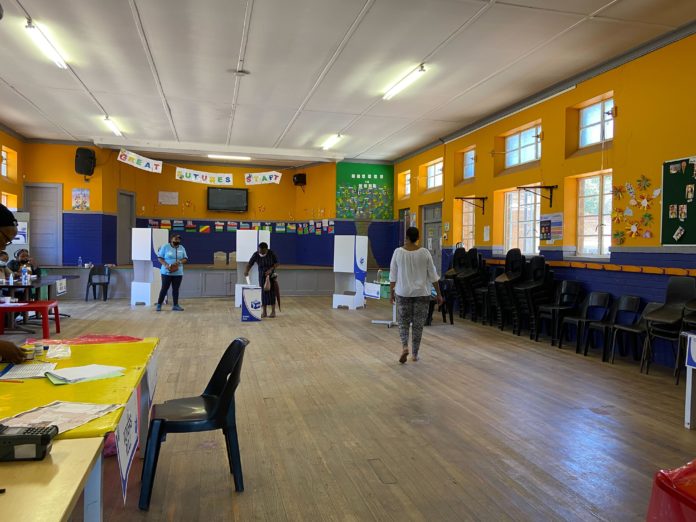One of the biggest takeaways from the 2021 local government elections was a massive decline in voter turnout. There are a number of reasons for this voter turnout. One of the reasons could be a decline of civic education. The Daily Vox team takes a closer look at what this all means.
RELATED:
NGOs take voter education engagements to communities #LGE2021
What is civic education?
Civic education” refers to the “provision of information and learning experiences to equip and empower citizens to participate in democratic processes”. While many think civic education only refers to voting as the primary way to participate in democratic process, this is not the case. The democratic process and being an active citizen is a multifaceted process.
Jennifer Rietbergen-McCracken writes that the “overall goal of civic education is to promote civic engagement and support democratic and participatory governance”. It is about promoting the demand for good governance as a necessary complement to efforts to improve the practice of good governance.
Why is it important to have a strong civic education + involved “citizens”?
Tebogo Suping is the executive director of ACTIVATE! Change Drivers network. Suping was
was an election observer during the local elections. She said some people did not understand the basic rules of voting. There was a lack of understanding between local and national elections. There were instances of voters turning up with no identity, or assuming they could vote anywhere. Critical votes were lost and many voters did not know who ward candidates were. The result was party allegiance as the main motivation to cast a vote.
“Civic education is therefore no longer optional but now a requirement in order to safeguard our democracy and for communities to thrive,” Suping said.
But is it only about voting?
Being an active citizen and having civic education is not only about voting. While voting is one of the ways people can use their civic education, the process is far more complicated. Rietbergen-McCracken writes that civic education is concerned with three different elements: civic knowledge, civic skills and civic disposition. Knowledge refers to citizens’
understanding of the workings of the political system and of their own political and civic rights and responsibilities. Skills refer to citizens’ ability to analyze, evaluate, take and defend positions. Dispositions are defined as the citizen traits necessary for a democracy.
While civic knowledge might be taught in schools at a basic level, the others are not focused on as much. This leads to situations where people think that 1) they only have a voice if they vote 2) their vote doesn’t count or 3) they can only vote for a certain party.
During the post-election period, The Daily Vox spoke to several political parties about civic education. According to many parties, they were successful in their education campaigns because they hit their personal targets. However, the Inkatha Freedom Party’s Mkhuleko Hlengwa admitted that “it is important that we have a new conversation around citizen activism and so far as the new democratic dispensation is concerned”.
The FF+’s Wouter Wessels said: “I think one of the biggest problems is that people don’t understand the electoral system […] That’s why people have lost confidence because they don’t understand that their vote counts. They don’t understand that no vote is wasted.”
RELATED:
The List: Five myths about the 2021 local elections
What is the state of civic education in South Africa?
During the leadup up to the local elections and even during the process there was a sense that many people were not aware of the implications of the local government elections. Many political parties used their national leadership as the face of their campaign. It was also the national leaders of parties who delivered the manifestos. This is despite the fact that local elections are about service delivery and localised issues.
The United Democratic Movement’s Bongani Msomi pointed out why this was problematic. “For most parties, it was the leaders of the parties that were campaigning on behalf of the candidates. That is not what is supposed to be happening. People must interact with their own candidates so that they can tell them about their expectations. Then the candidates must be able to answer about what they are going to do for the community,” he said.
In 2019, the Electoral Commission’s Sy Mamabolo said: “Voter education needs to be integrated with the curriculum at schools, and that civic consciousness will address the type of attitude that citizens must have on matters of elections. But, that civic consciousness is broader than just elections. It’s about how one interprets the political system and how one engages with public participation processes amongst other things.”
RELATED:
How Civic Education Can Ensure Youth Democratic Participation
How educated are first time voters in South Africa?
Letlhogonolo Letshele is an electoral systems researcher at My Vote Counts. Lesthele said first time voters do not often understand the electoral process. This sometimes contributes to them not effectively participating in the process.They also do not engage in electoral politics at all. This adds to voter apathy. In some instances, citizens do not understand the different types of elections, and who their elected representatives are. Problems arise when elected representatives need to be held accountable for service delivery issues.
“Citizens do not understand the role of government spheres, what services they provide and where they are based. That’s why some citizens think they can vote for ward councillors in different areas from where they live.This often leads to them being turned away from the voting district or not being able to cast their vote at all,” Letshele said.
There needs to be greater civic participation and education taking place in all spheres of society for people to understand their civic rights and responsibilities.









